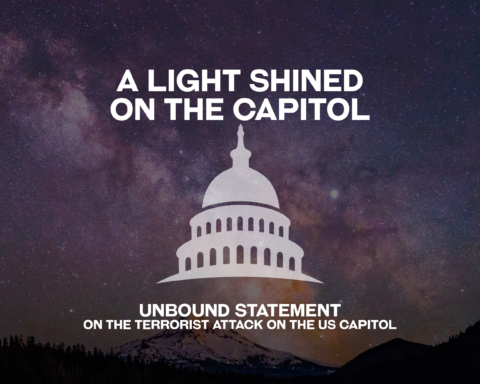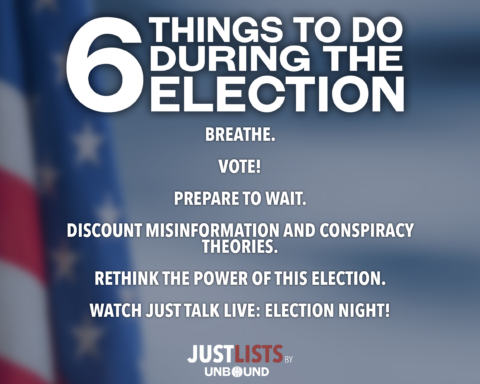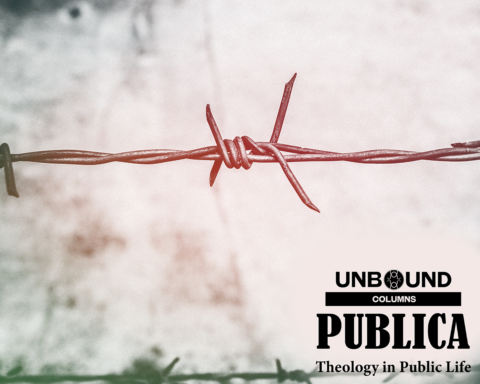The Potential Long-Term Effects of our Discourse this Election Season
A version of this article was originally published at https://alexispmaloof.com/2015/10/12/be-sober-be-watchful-activism-and-public-discourse/.

To absolutely no one’s surprise, election season is upon us again.
Admittedly, it’d be hard for anyone to miss the circus surrounding this year’s historic presidential election. Its coverage in the media and presence in public discourse for the past year has been loud – bordering on deafening – and ubiquitous. The 2016 presidential election is unprecedented in several ways. The candidates themselves represent different “firsts,” from the first female candidate from a major political party to the first candidate to star in his own reality TV show.
In many ways, this election season has been defined not only by the candidates themselves, but by the vitriolic rhetoric characteristic of the race. This rhetoric has dominated the headlines for so long now that, perhaps without even realizing it, we have become increasingly inured to this trenchant and malicious political discourse.
But the thing is, we really can’t afford to be to be numb. Now more than ever, it is imperative that we pay attention, both to the tenor and to the specific claims of our candidates and elected officials.
As justice-minded Christians, we must understand that the so-called “hot topics” and “issues” being debated and discussed in the public forum – immigration, gun policy, prison reform, the status of refugees, and much more – translate into actual matters of life and death for so many of our brothers and sisters in this nation and around the world. This means that, like it or not, we can never opt out of engagement in political discourse or the public sphere. Public policy and legislation are matters of justice, and we must not continue to allow politicians to use discourse to reduce human lives to “issues,” or to pretend their words have no affect on the material conditions of those for whom these “issues” constitute aspects of their daily lives.
___________________________________________
The presidential race will be over soon, but the long-term effects of the last three years of GOP rhetoric will linger on.
___________________________________________
Simply put, discourse (which I define as everything spoken, written, and, yes, even tweeted in political dialogue) matters. It matters tremendously. “But why?”, you may ask. “Isn’t it enough to vote, without having to wade into the swampy mess of political dialogue and quibble tediously over words?”
 In response, I point to Marilyn Chandler McEntryre’s book, Caring for Words in a Culture of Lies, in which she argues that that “caring for language is a moral issue.” Chandler makes the case that there exists a very real connection between the language we use (discourse) and the material conditions of the world which we consider under the realm of “morality.” She notes that discourse – words themselves – do not exist in a vacuum. Rather, the concrete, moral implications of discourse are evident when we see the material impact rhetoric and the language of policy have on vulnerable peoples in our society, people towards whom God has called us to be hospitable and to serve. Islamophobia and fear-mongering are proclaimed in the public arena, and an imam and his assistant are shot on the streets of New York. For McEntyre, as for members of this imam’s community, there is no doubt that the discourse and actions are connected. In fact, McEntyre goes on to say that the pursuit of truthful and just language is in fact a moral imperative. As such, we are called into public discourse in the same way that we are called to the pursuit of social justice. The two are intricately connected.
In response, I point to Marilyn Chandler McEntryre’s book, Caring for Words in a Culture of Lies, in which she argues that that “caring for language is a moral issue.” Chandler makes the case that there exists a very real connection between the language we use (discourse) and the material conditions of the world which we consider under the realm of “morality.” She notes that discourse – words themselves – do not exist in a vacuum. Rather, the concrete, moral implications of discourse are evident when we see the material impact rhetoric and the language of policy have on vulnerable peoples in our society, people towards whom God has called us to be hospitable and to serve. Islamophobia and fear-mongering are proclaimed in the public arena, and an imam and his assistant are shot on the streets of New York. For McEntyre, as for members of this imam’s community, there is no doubt that the discourse and actions are connected. In fact, McEntyre goes on to say that the pursuit of truthful and just language is in fact a moral imperative. As such, we are called into public discourse in the same way that we are called to the pursuit of social justice. The two are intricately connected.
In our current political discourse, there seems to be no end to the ways language is used to obfuscate the truth and distract us from closely examining the issues themselves. McEntyre’s assertion that we live in “a culture of lies” might feel dramatic – until we consider that, at this point in the race, only 4% of the statements made by the the GOP presidential candidates can be classified as “true” statements according to independent, nonpartisan fact checkers.
What’s more, the age of social media and the twenty-four hour news cycle presents a distinctly 21st-century challenge to McEntyre’s call to care for language, due in large part to the sheer volume of language we take in on a daily basis. To “care” for language, according to McEntyre, means that abuses of language such as “thoughtless hyperbole, unexamined metaphors, slogan and sound bites, grammatical confusion, ungrounded abstraction, overstatement, and blather” must be named as such – as abuses. Yet our overwhelming exposure to media numbs us to such abuses – and are we really called to respond every time?
___________________________________________
“Be sober-minded; be watchful. Your adversary the devil prowls around like a roaring lion, seeking someone to devour.” – 1 Peter 5:8 (ESV)
___________________________________________
The Petrine author writes to an audience of persecuted churches in 1 Peter, exhorting them to “be sober, be watchful” in the facing of their enemies. It is advice that we too would do well to take on in our pursuit of truthful and just language. McEntrye says that caring for language requires “an active habit of mind”. In order to develop this active habit, we must allow a moral concern for language to become part of our consciousness; we must use it as a framework for viewing all discourse. It means that we must use the tools of self-reflection and critical thinking to approach and evaluate language. These tools are God-given, but they require practice to hone and refine.
We can use the exhortation in 1 Peter as a guide to help us figure out what it looks to “care for language” in a culture of lies.
 We must be sober-minded: With a clear, unobstructed mind, we should look closely at the language in our public and political discourse. Is the language being used by public figures careful, precise, and truthful? Are words being used to promote public welfare or the narrow interests of the few? Even simpler, ask: are these words kind, or are they rooted in hate and fear? Being sober-minded requires us to clearheaded; recognizing our own personal biases, cultural preferences, and privileges so that, by checking them, we might begin to be logical and fair in our evaluations.
We must be sober-minded: With a clear, unobstructed mind, we should look closely at the language in our public and political discourse. Is the language being used by public figures careful, precise, and truthful? Are words being used to promote public welfare or the narrow interests of the few? Even simpler, ask: are these words kind, or are they rooted in hate and fear? Being sober-minded requires us to clearheaded; recognizing our own personal biases, cultural preferences, and privileges so that, by checking them, we might begin to be logical and fair in our evaluations.- We must be watchful: We must evaluate and test the words we receive for truthfulness. In the same way we notice what is being said, we also must watch for what is being left out. Watchful and alert, we are able to notice the ways that prevarications based on false assumptions, misleading data, logical fallacies, hyperbole, and imprecision take root in public discourse and threaten the well-being of our communities. As McEntyre puts it, we have a responsibility “not to tolerate lies”.
By taking seriously the task of caring for language and watching for its abuse, we are acknowledging that discourse has very real and material consequences in the world. We need look no farther than the correspondence between strong anti-Muslim rhetoric and the increase of Islamophobic violence in our country country to see the catastrophic consequences of hateful language. We may consider carefully the long-term consequence of our exposure to the xenophobic, misogynistic, and racist language Donald Trump has filled our political discourse within this election. What is the danger that we may become numb to this kind of talk, that it may begin to feel “normal”?
For McEntyre, part of truth-seeking includes a “willingness to call liars to account.” Those figures who shape our public discourse, who operate in the public arena, and who profit from their participation in it, must also expect to be held accountable for their language, no matter how tiresome, fruitless, emotionally taxing it may feel. We cannot defer this responsibility to the media, for we have seen their complicity in catering to abusive language for ratings and profit.
___________________________________________
Discourse – words themselves – do not exist in a vacuum. Rather, the concrete, moral implications of discourse are evident when we see the material impact rhetoric and the language of policy have on vulnerable peoples in our society.
___________________________________________
As the the Church, we are called to be healers. And when rhetoric wounds, healing is required. The presidential race will be over soon, but the long-term effects of the last three years of GOP rhetoric will linger on. We have seen this time and time again. We saw the retaliation unleashed against Muslim communities across America after President Bush used anti-Muslim rhetoric to condemn the 9/11 terrorist attacks. We hear echoes of the legacy and language of Japanese internment camps when Trump calls for immigrants to be rounded up and put away.

Trump’s calling card for his campaign is that he “tells it like it is.” The insidious implication that the stereotypes and hyperbole he peddles is actually an insightful and accurate descriptions of our country is the very definition of an abuse of language.
You may have already noticed a lamenting of one particular feature of rhetoric in our political discourse this election season – that of ‘political correctness’. GOP candidate Trump famously stated, “I think the big problem this country has is being politically correct. I’ve been challenged by so many people and I don’t, frankly, have time for total political correctness.” As a description of language, ‘political correctness’ has had varying definitions that have changed over time; in today’s political climate, it serves as “a sort of catch-all term we apply to people who ask for more sensitivity to a particular cause than we’re willing to give — a way to dismiss issues as frivolous in order to justify ignoring them.”
Here is why this decrying of “political correctness” is dangerous: We have seen, over and over again, the very real and justifiable concerns of marginalized groups blown off as ploys for ‘political correctness,’ reducing and dismissing the true issues at hand and silencing the voices of those outside of the mainstream. In the case of Mr. Trump, labeling arguments that oppose his own views as “P.C. nonsense” is simply another technique to keep those less privileged out of the minds of his potential voters. It brushes aside the very real, pressing issues of racial justice and police brutality, the detention of immigrants, the wage gap, gun violence, and many others. It is a horrible kind of deceit to reduce caring for language that is inclusive and respectful, language that includes the concerns of those on the margins, to simple ‘political correctness’ – and therefore unworthy of our attention.
___________________________________________
“So then, putting away falsehood, let all of us speak the truth to our neighbors, for we are members of one another.” – Ephesians 4:25, (NRSV)
___________________________________________
I have mentioned above that I feel that caring for truthful and careful language in the public discourse is a moral issue for justice-minded Christians. But it is also worth pointing out that, in general, good democracy depends on informed citizens. Our responsibility is not only to God, but to one another, to use wisdom in order to seek out the truth and, in the pursuit of our own healing, name the offenses against language committed by those who are shaping our public discourse.

For those of us who are Reformed, we come from a very word-centric tradition. We must remind ourselves that, Christ, the logos, was the Word that became flesh and lived among us. Our own words also have life – in the stories we tell about ourselves and others. Examination of our language and the preservation of truthful words is a form of activism that is directly related to our pursuit of justice. McEntytre writes that “we have been ‘called by name’ – not every one of us to public speaking, political activism in the streets, or investigative journalism, but all of us to seek truth and follow after it, to do justice, to love mercy, and to walk humbly with God”. We serve these callings by cultivating an active habit of mind that leads us toward a sober and watchful caring for language. We serve them, too, by calling out lies when we hear them, interrupting the dominant narrative with a word of truth from the margins.
This election season, I am committing myself to remembering in my examination of public discourse, that we belong to each other. When we speak well, our words will reflect this sacred truth. Language has the power to transform and turn empires upside down, so let us attend to it carefully.
*****
AUTHOR BIO: Alexis Presseau Maloof holds a Bachelor’s in Religious Studies and a Master’s in Writing, both from DePaul University in Chicago. She is a lifelong Presbyterian and an ordained ruling elder in the PC(USA). Formerly a writing instructor and manager of a literacies center at a community college, she is currently an at-home parent of one wild and wonderful little boy and enjoys freelance writing and blogging on her website in her spare time.






Unbound Social